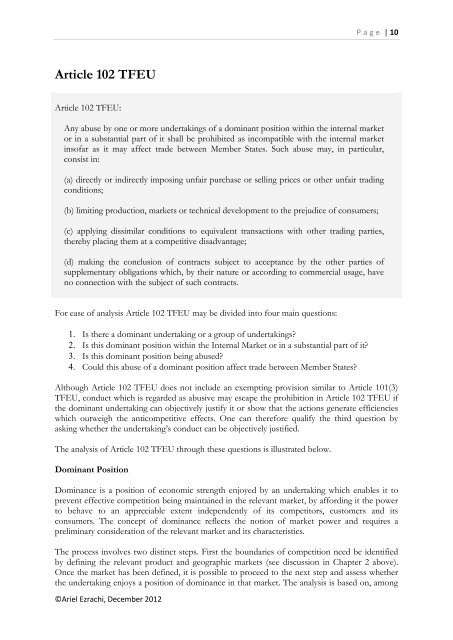EU Competition Law and Policy - compal
EU Competition Law and Policy - compal
EU Competition Law and Policy - compal
You also want an ePaper? Increase the reach of your titles
YUMPU automatically turns print PDFs into web optimized ePapers that Google loves.
Article 102 TF<strong>EU</strong><br />
Article 102 TF<strong>EU</strong>:<br />
©Ariel Ezrachi, December 2012<br />
P a g e | 10<br />
Any abuse by one or more undertakings of a dominant position within the internal market<br />
or in a substantial part of it shall be prohibited as incompatible with the internal market<br />
insofar as it may affect trade between Member States. Such abuse may, in particular,<br />
consist in:<br />
(a) directly or indirectly imposing unfair purchase or selling prices or other unfair trading<br />
conditions;<br />
(b) limiting production, markets or technical development to the prejudice of consumers;<br />
(c) applying dissimilar conditions to equivalent transactions with other trading parties,<br />
thereby placing them at a competitive disadvantage;<br />
(d) making the conclusion of contracts subject to acceptance by the other parties of<br />
supplementary obligations which, by their nature or according to commercial usage, have<br />
no connection with the subject of such contracts.<br />
For ease of analysis Article 102 TF<strong>EU</strong> may be divided into four main questions:<br />
1. Is there a dominant undertaking or a group of undertakings?<br />
2. Is this dominant position within the Internal Market or in a substantial part of it?<br />
3. Is this dominant position being abused?<br />
4. Could this abuse of a dominant position affect trade between Member States?<br />
Although Article 102 TF<strong>EU</strong> does not include an exempting provision similar to Article 101(3)<br />
TF<strong>EU</strong>, conduct which is regarded as abusive may escape the prohibition in Article 102 TF<strong>EU</strong> if<br />
the dominant undertaking can objectively justify it or show that the actions generate efficiencies<br />
which outweigh the anticompetitive effects. One can therefore qualify the third question by<br />
asking whether the undertaking’s conduct can be objectively justified.<br />
The analysis of Article 102 TF<strong>EU</strong> through these questions is illustrated below.<br />
Dominant Position<br />
Dominance is a position of economic strength enjoyed by an undertaking which enables it to<br />
prevent effective competition being maintained in the relevant market, by affording it the power<br />
to behave to an appreciable extent independently of its competitors, customers <strong>and</strong> its<br />
consumers. The concept of dominance reflects the notion of market power <strong>and</strong> requires a<br />
preliminary consideration of the relevant market <strong>and</strong> its characteristics.<br />
The process involves two distinct steps. First the boundaries of competition need be identified<br />
by defining the relevant product <strong>and</strong> geographic markets (see discussion in Chapter 2 above).<br />
Once the market has been defined, it is possible to proceed to the next step <strong>and</strong> assess whether<br />
the undertaking enjoys a position of dominance in that market. The analysis is based on, among



